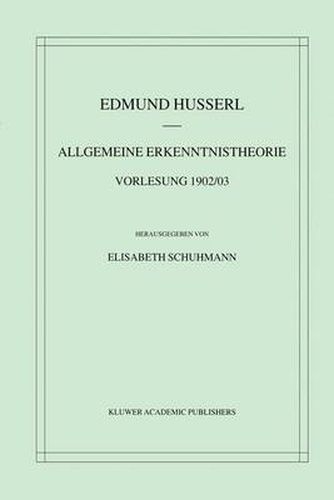Readings Newsletter
Become a Readings Member to make your shopping experience even easier.
Sign in or sign up for free!
You’re not far away from qualifying for FREE standard shipping within Australia
You’ve qualified for FREE standard shipping within Australia
The cart is loading…






This title is printed to order. This book may have been self-published. If so, we cannot guarantee the quality of the content. In the main most books will have gone through the editing process however some may not. We therefore suggest that you be aware of this before ordering this book. If in doubt check either the author or publisher’s details as we are unable to accept any returns unless they are faulty. Please contact us if you have any questions.
Im vorliegenden Band wird der Text von Husserls Goettinger Vorlesung “Allgemeine Erkenntnistheorie’ vom Winter 1902/03 veroeffentlicht, in der er erstmals eine phanomenologische Erkenntnistheorie zu entwerfen suchte. Obwohl bei der Darstellung des Psychologismus auf die Prolegomena zuruckgreifend, ging er uber die Logischen Untersuchungen hinaus in der Herausarbeitung der Zweifellosigkeit der cogitatio, der Analyse der perzeptiven und symbolischen Vorstellungen und der Darstellung der Wahrscheinlichkeit als des Prinzips der Erfahrungserkenntnis.
$9.00 standard shipping within Australia
FREE standard shipping within Australia for orders over $100.00
Express & International shipping calculated at checkout
This title is printed to order. This book may have been self-published. If so, we cannot guarantee the quality of the content. In the main most books will have gone through the editing process however some may not. We therefore suggest that you be aware of this before ordering this book. If in doubt check either the author or publisher’s details as we are unable to accept any returns unless they are faulty. Please contact us if you have any questions.
Im vorliegenden Band wird der Text von Husserls Goettinger Vorlesung “Allgemeine Erkenntnistheorie’ vom Winter 1902/03 veroeffentlicht, in der er erstmals eine phanomenologische Erkenntnistheorie zu entwerfen suchte. Obwohl bei der Darstellung des Psychologismus auf die Prolegomena zuruckgreifend, ging er uber die Logischen Untersuchungen hinaus in der Herausarbeitung der Zweifellosigkeit der cogitatio, der Analyse der perzeptiven und symbolischen Vorstellungen und der Darstellung der Wahrscheinlichkeit als des Prinzips der Erfahrungserkenntnis.